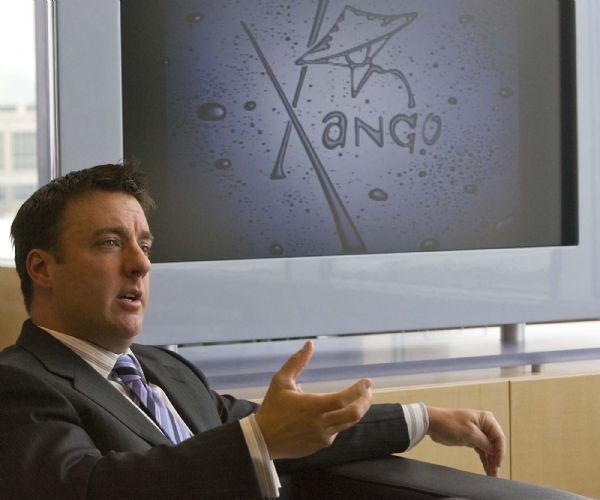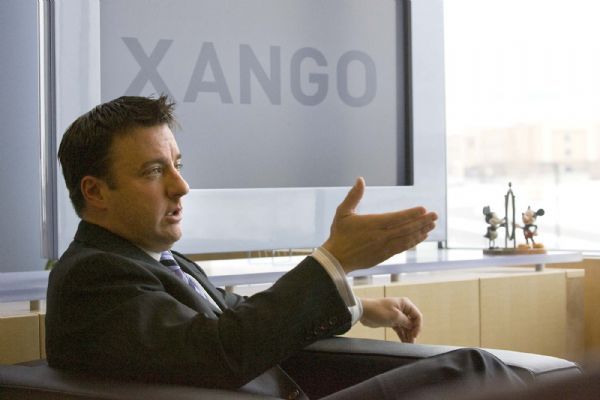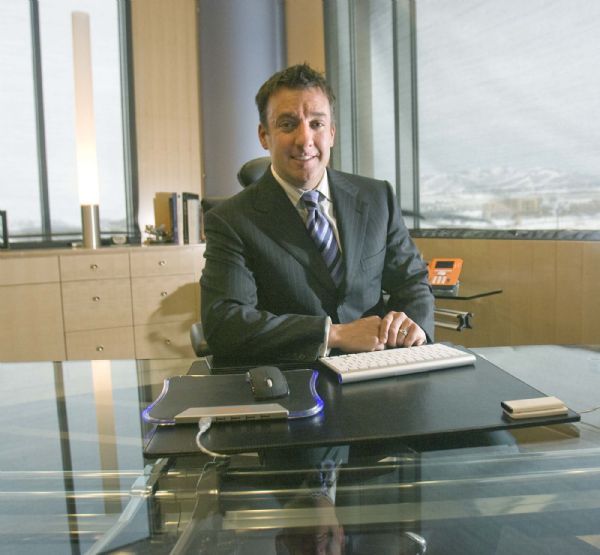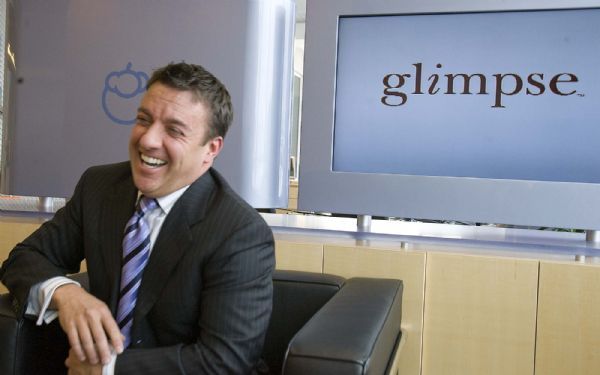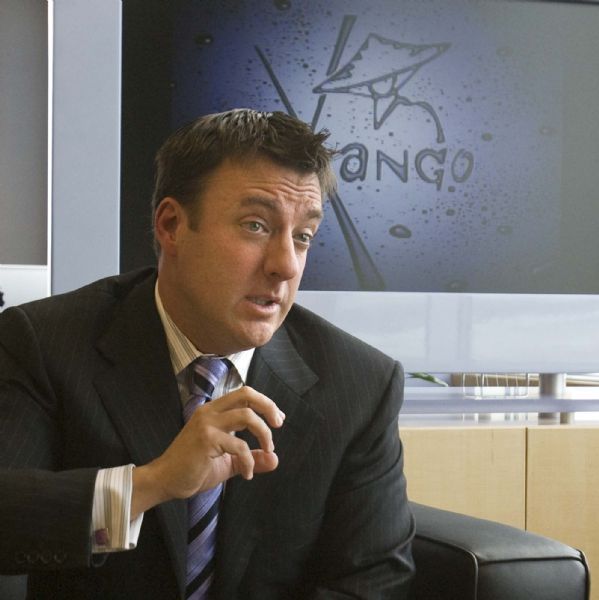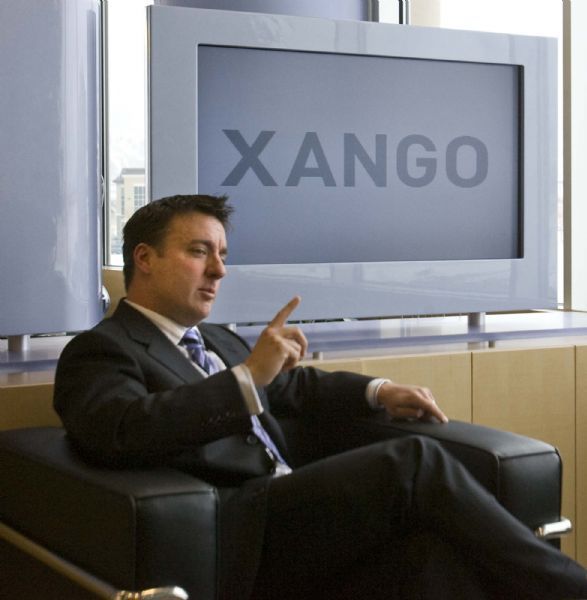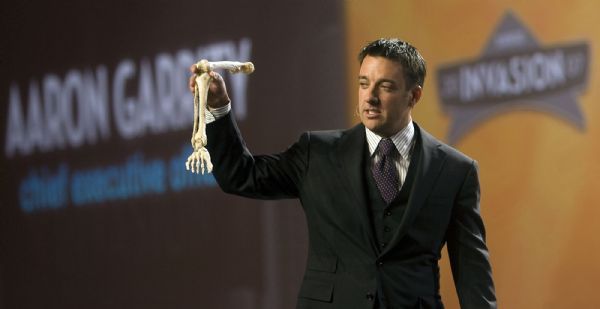This is an archived article that was published on sltrib.com in 2010, and information in the article may be outdated. It is provided only for personal research purposes and may not be reprinted.
As Aaron Garrity tells it, a decade ago
the multilevel marketing industry in Utah was
like a tired old man that not even mega-doses of its various nutritional supplements could revitalize.
Then in 2002 came the call from Malaysia -- Joe Morton on the line about a fruit he had been served at a restaurant. Its name was mangosteen, and because of it the nutritional supplements industry in this state has never been quite the same.
XanGo, the company Garrity, Morton and others created, has enjoyed phenomenal success, peddling juice and other products based on mangosteen. Garrity's branding vision has enabled the company to sell a bottle of fruit juice less than a quart in size for $25. Millions have been sold.
The success has brought Garrity and other founders great riches, and him a singular amount of acclaim. It also has given rise to detractors.
During the heady times of 2005 and 2006, Garrity received almost $6.5 million in profits in one year. Along the way, some allege that the mostly 30-something founders also engaged in an orgy of consumption at their company's expense. Lawsuits filed by XanGo investors maintain they received $6,000 per month vehicle allowances and spent lavishly on themselves and their families for luxuries ranging from chartered plane rides to shopping in New York's finest stores to buying grand pianos to vacationing in Hawaii.
Attorneys representing the company dismiss the allegations as a veiled attempt at extortion, even as Garrity and Lehi-based XanGo march on.
--
Honors and recognition » At 41, Garrity has become chairman of the XanGo board after years as its CEO. For his role in founding and building the company, he has been recognized by numerous organizations:
» Ernst & Young's entrepreneur of the year for Utah and a finalist for a national honor.
» Named one of the top seven most influential people in multilevel marketing by DirectSellingLive.com, which follows the industry.
» Included in a study of the characteristics of highly innovative corporate managers published in Harvard Business Review that included Jeff Bezos of Amazon.com and Michael Dell of Dell Computers.
Jeff Dyer, one of the study's authors and chairman of organizational leadership and strategy at Brigham Young University, said Garrity's particular strengths are in branding and marketing.
"I also think he's really someone who likes to challenge the status quo and make [things] better," said Dyer, who is turning the study into a book.
DirectSellingLive CEO Keeper Catran-Whitney speaks to the company's appeal. "What XanGo has done, primarily because of Aaron, is they believe in being everywhere at once, We're seeing a lot of people flocking to what XanGo is all about."
Several themes are big with Garrity when he talks about XanGo. One is building the company as a brand, not just a producer of products. Another is running a company in which leadership is rewarded at every level. He also talks is about seizing opportunity.
It is the latter that takes Garrity back to his childhood in the Los Angeles area, which was marked by his parents' divorce when he was only 1. His mother raised three kids on her own before remarrying when Garrity was 13. As a single mother, at times she worked three jobs.
"I never knew we were poor growing up," Garrity said in a recent interview. "So when I saw opportunity I went after it because I never knew any better."
Garrity delivered newspapers before landing a job at 16 at Nordstrom, the department store known for its customer service. That gave him his first lesson in what it means for a business to create an image through marketing. He also worked for Giorgio of Beverly Hills, Liz Claiborne and Jessica McClintock, companies where "brand is everything."
After high school, Garrity went on a Mormon mission to France and entered Brigham Young University in 1986, earning degrees in 1993 in marketing and French. He stayed in school to earn an MBA and a law degree.
--
Multilevel marketing » He married, and during his BYU days Garrity's wife began working at Enrich International, one of the many multilevel marketing companies based in Utah that sell nutritional products such as herbs, vitamins, minerals and personal-care products to networks of independent distributors.
Some critics label such business strategies as pyramid schemes, which instead of focusing on retail sales rely on recruiting distributors to whom products are sold. Commissions from those sales filter up through the levels to the top. For the companies, multilevel marketing provides distinct advantages such as getting the word out about a product through distributors (rather than employing a sales force) and building a name without huge marketing expenses.
MLMs also can generate a spigot of cash.
Garrity got a marketing job at Enrich International, "and I absolutely fell in love with the industry." Gary Hollister later was named CEO and began his reign by asking employees to assess its operations.
When it was his turn, Garrity poured out his frustrations. Forty-five minutes later, Garrity asked Hollister what he thought. "He said, 'Well I think you're one of the most negative individuals I've ever met.' " Garrity thought his time was over, but Hollister saw something else. "I lectured him a little bit about 'Bring me a problem, bring me a solution,' " Hollister said in a recent interview. "It was evident this man had a grasp of the problems but he also had a way of solving them."
For his part, Garrity said "I decided that night I was going to be part of the solution and not the problem, and I've never looked back." Hollister mentored Garrity and later joined him as a XanGo founder.
--
On the lookout for opportunity » It also was at Enrich where Garrity met Joe and Gordon Morton. Originally from Canada, the brothers had grown up with herbal supplements. Their mother owned a botanicals store and their father managed Nature's Sunshine, one of the earliest of Utah's nutritional products companies.
Like Garrity, they were young and on the lookout for opportunities. But in Utah they saw only a moribund industry wedded to old ways of doing business.
"Gordon Morton said it was very apparent this industry needed an enema to get it moving again," said Garrity, who came to realize that no one in the multilevel marketing of nutritional products had a commitment to building a brand.
"Companies would spend on the contents of products and pay less attention to the brand because in their minds the distributors took care of that."
After seven or so years at Enrich, Garrity went to work for Morinda Holdings, which operates Tahitian Noni International, a seller of a juice based on the noni plant from French Polynesia.
Morinda would sue Garrity and the five other founders the year after they formed XanGo, claiming that the concept for a juice based on mangosteen was stolen from it. XanGo countersued, and the case was settled out of court in 2006 , its contents sealed.
Garrity's story is that the idea for mangosteen sprang from Joe Morton's Malaysian call in 2002 during which Morton said the fruit had been consumed for centuries for its medicinal qualities. There also reportedly were scientific studies demonstrating the health benefits of the fruit.
"So it was kind of there that it clicked,"said Garrity, then 34. "So now it was do or die," and that meant creating a brand.
From XanGo's beginnings in 2002, Garrity set about building an image -- the zippy name, the distinctively-shaped glass juice bottle, the promise of a 50 percent return on revenues to distributors and an emphasis on customer service. He also created a charitable arm in which the company's 1.5 million distributors in more than 30 countries could participate in worthy projects such as Operation Smile, which provides free surgeries to repair clef lip and other deformities for children around the world.
XanGo, which employs more than 400 people in Utah, took advantage of technology to create the industry's first TV channel online and blogs, while also relying on other forms of social media.
"XanGo was probably the first company to create a social media space for its distributors," said Catran-Whitney of DirectSellingLive.com. "All the others have pushed back against it."
--
Unwanted attention » As with many companies that enjoy outsized success, there was push back of another kind. While Garrity and his team were making millions, their actions drew attention that wasn't always desired.
Documents from court files that are part of several lawsuits against XanGo show that in 2005, Garrity received a
taxable distribution from company profits of $6.64 million. Extrapolating that amount using Garrity's 17.1 percent ownership share shows that the company had taxable income of $38.69 million for distribution to its owners.
For tax purposes in 2006, Garrity's share of XanGo's profits was $6.3 million, with the company showing taxable income of $36.7 million.
Company credit card statements that show that on just one monthly bill, dated Jan. 2, 2008, Garrity rang up $172,437. Lawsuits from minority investors allege Garrity and others made numerous personal purchases with company credit cards from New York stores such as Saks Fifth Avenue and Cartier, and spent $25,000 on home furnishings, while also buying Father's Day and Mother's Day presents.
The lawsuits also allege the founders gave each other expensive gifts, while also buying clothing for their wives.
"Our clients' perspective is the company was recklessly run," said Mary Anne Wood, attorney for Angels Investors LLC, which owns about 1 percent of the company and claims it was financially damaged by improper conduct. "There were no accounting controls over the use of personal credit cards."
The company denies the allegations, while also alleging that the investors are suing to try to force XanGo to "buy out Angel's interest at an exorbitant price just to avoid further harassment."
Further, the company claims in court documents that two members of the Angels group have ties to rival juice company MonaVie of South Jordan, one of the nutritional supplements companies that sprung up after XanGo.
"The founders have created an enormously successful business and have been responsible and fair with investors," said Salt Lake attorney Robert S. Clark, who represents XanGo in the lawsuits. "Investors have received their full share of distributions and made an enormous profit."
He said the lawsuits "show expenses without contexts" and that noncash bonuses and incentives are common in the industry.
"To the best of the company's knowledge, all personal expenses are properly accounted for taxes," he said. "XanGo has continued to upgrade its record-keeping in scale with its astounding global growth."
Lawsuits aside, the success and branding go on.
In a first-of-its kind marketing effort in U.S. professional sports in November 2006, the XanGo name was emblazoned across the jersey fronts of the Real Salt Lake soccer team.
Garrity said the deal associates the company with the most popular sport in the world. It was another first for XanGo, soon followed by other companies, including a California multilevel seller of nutritional supplements called Herbalife, which put is name on the jerseys of the Los Angeles Galaxy.
Last November, Real Salt Lake and the Galaxy met in Seattle for the championship of Major League Soccer -- XanGo versus Herbalife.
XanGo won.
A broad vision of branding guides XanGo's success, but it also sells actual products, such as its mangosteen juice.
Since its founding, XanGo has branched out from selling juice to include vitamin capsules and skin and body care products.
Still, it's the juice that drives the company.
XanGo refuses to disclose what percentage of its juice is mangosteen, the nutrient-laden fruit from Southeast Asia.
Apple juice is the second ingredient listed on the XanGo bottle after "Whole Mangosteen Purée." Other juices are pear, grape, blueberry, raspberry, strawberry, cranberry and cherry, and pear purée also is an ingredient.
It appears that the ground up pulp and skin of the mangosteen, where the healthy nutrients reside, are no more than around 20 percent of the 25.35 ounce bottles. That would mean that most of the bottle that sells for $25 to independent distributors is made up of other juices.


